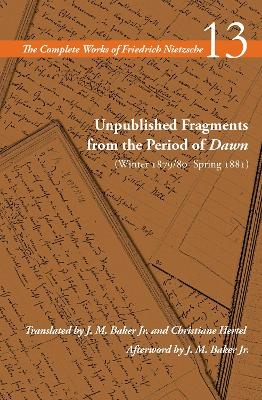
Unpublished Fragments from the Period of Dawn (Winter 1879/80–Spring 1881)
Volume 13
Seiten
2023
Stanford University Press (Verlag)
978-1-5036-3698-9 (ISBN)
Stanford University Press (Verlag)
978-1-5036-3698-9 (ISBN)
This volume provides the first English translation of Nietzsche's unpublished notes from late 1879 to early 1881, the period in which he authored Dawn, the second book in the trilogy that began with Human, All Too Human and concluded with The Joyful Science.
In these fragments, we see Nietzsche developing the conceptual triad of morals, customs, and ethics, which undergirds his critique of morality as the reification into law or dogma of conceptions of good and evil. Here, Nietzsche assesses Christianity's role in the determination of moral values as the highest values and of redemption as the representation of humanity's highest aspirations. These notes show the resulting tension between Nietzsche's contrasting thoughts on modernity, which he critiques as an unrecognized aftereffect of the Christian worldview, but also views as the springboard to "the dawn" of a transformed humanity and culture. The fragments further allow readers insight into Nietzsche's continuous internal debate with exemplary figures in his own life and culture—Napoleon, Schopenhauer, and Wagner—who represented challenges to hitherto existing morals and culture—challenges that remained exemplary for Nietzsche precisely in their failure.
Presented in Nietzsche's aphoristic style, Dawn is a book that must be read between the lines, and these fragments are an essential aid to students and scholars seeking to probe this work and its partners.
In these fragments, we see Nietzsche developing the conceptual triad of morals, customs, and ethics, which undergirds his critique of morality as the reification into law or dogma of conceptions of good and evil. Here, Nietzsche assesses Christianity's role in the determination of moral values as the highest values and of redemption as the representation of humanity's highest aspirations. These notes show the resulting tension between Nietzsche's contrasting thoughts on modernity, which he critiques as an unrecognized aftereffect of the Christian worldview, but also views as the springboard to "the dawn" of a transformed humanity and culture. The fragments further allow readers insight into Nietzsche's continuous internal debate with exemplary figures in his own life and culture—Napoleon, Schopenhauer, and Wagner—who represented challenges to hitherto existing morals and culture—challenges that remained exemplary for Nietzsche precisely in their failure.
Presented in Nietzsche's aphoristic style, Dawn is a book that must be read between the lines, and these fragments are an essential aid to students and scholars seeking to probe this work and its partners.
J. M. Baker, Jr. is Associate Professor Emeritus and former Dean of Liberal Arts at The University of the Arts in Philadelphia.Christiane Hertel is Professor Emeritus in the History of Art Department at Bryn Mawr College. Her most recent book is Siting China in Germany: Eighteenth-century Chinoiserie and its Modern Legacy (2019).
Notebook 1 = N V 1. Beginning of 1880
Notebook 2 = N V 2. Spring 1880
Notebook 3 = M II 1. Spring 1880
Notebook 4 = N V 3. Summer 1880
Notebook 5 = Mp XV 1a. Summer 1880
Notebook 6 = N V 4. Autumn 1880
Notebook 7 = N V 6. End of 1880
Notebook 8 = N V 5. Winter 1880–1881
Notebook 9 = M II 2. Winter 1880–1881
Notebook 10 = Mp XV 1b. Spring 1880–Spring
Notes
Translator's Afterword
Index of Persons
Subject Index
| Erscheinungsdatum | 29.11.2023 |
|---|---|
| Reihe/Serie | The Complete Works of Friedrich Nietzsche |
| Übersetzer | J. M. Baker, Christiane Hertel |
| Verlagsort | Palo Alto |
| Sprache | englisch |
| Maße | 121 x 184 mm |
| Themenwelt | Geisteswissenschaften ► Philosophie ► Ethik |
| Geisteswissenschaften ► Philosophie ► Philosophie der Neuzeit | |
| ISBN-10 | 1-5036-3698-4 / 1503636984 |
| ISBN-13 | 978-1-5036-3698-9 / 9781503636989 |
| Zustand | Neuware |
| Haben Sie eine Frage zum Produkt? |
Mehr entdecken
aus dem Bereich
aus dem Bereich


